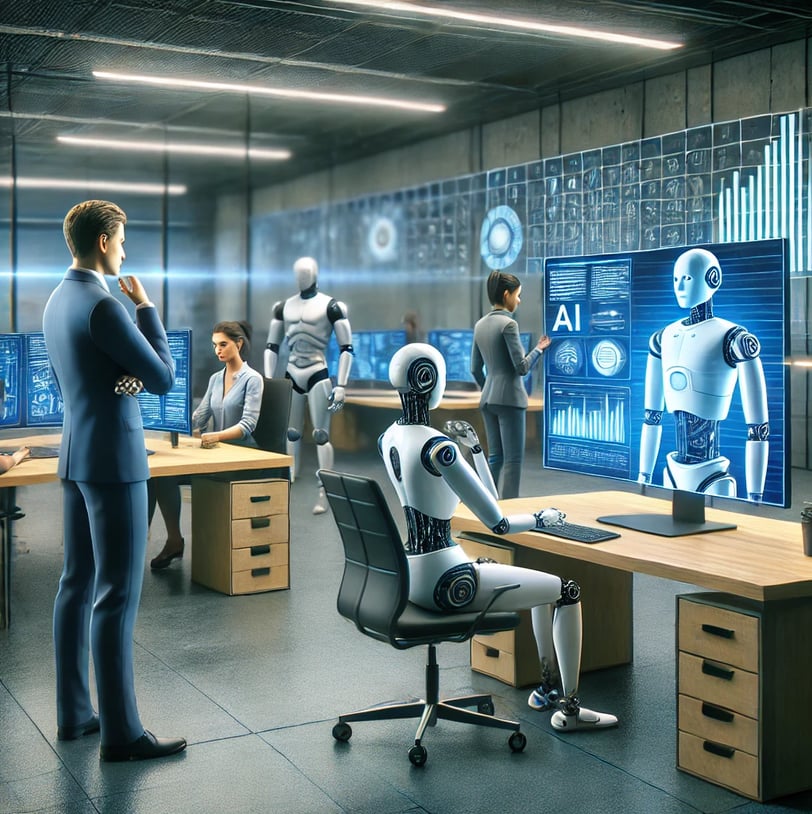The Impact of Artificial Intelligence on the Job Market: Challenges and Opportunities
Artificial intelligence (AI) has rapidly transformed industries worldwide, bringing both excitement and concern regarding its impact on the job market. As automation and machine learning technologies advance, businesses are optimizing processes, reducing costs, and increasing efficiency. However, these advancements also raise questions about job displacement, skill adaptation, and new career opportunities. In this article, we explore how AI is reshaping the workforce and how individuals can prepare for this evolving landscape.
2/19/20252 min read


How AI Is Changing the Job Market
AI is no longer a futuristic concept; it is actively influencing various sectors, from finance and healthcare to retail and manufacturing. Its integration into the job market is happening in multiple ways:
Automation of Repetitive Tasks: AI-powered robots and software can perform routine tasks faster and with fewer errors than humans. This is particularly evident in manufacturing, customer service, and administrative roles.
Enhancing Decision-Making: AI analyzes large datasets to provide insights and predictions, aiding professionals in fields such as finance, marketing, and healthcare.
Job Creation in New Fields: While some jobs are being automated, AI is also generating new career opportunities in areas such as data science, AI ethics, and robotics engineering.
Personalized Customer Experiences: AI-driven chatbots, recommendation systems, and virtual assistants are improving customer interactions and increasing business efficiency.
Jobs Most Affected by AI
AI’s impact varies across industries, with some roles more vulnerable to automation than others. Here are some categories of jobs that are most affected:
High-Risk Jobs for Automation:
Data entry clerks
Telemarketers
Retail cashiers
Warehouse workers
Bank tellers
Jobs That Require Adaptation:
Accountants and auditors (AI automates calculations, but professionals need to interpret results)
Customer service representatives (AI chatbots handle simple inquiries, but complex issues require human intervention)
Healthcare professionals (AI assists in diagnostics, but patient care remains human-driven)
Growing Job Opportunities:
AI and machine learning engineers
Cybersecurity analysts
AI ethics specialists
Data scientists
Digital transformation consultants
How to Prepare for the AI-Driven Job Market
Instead of fearing AI, professionals should focus on adapting and gaining relevant skills to thrive in this evolving job market. Here are some strategies:
Develop Technical Skills: Learning coding, data analysis, and AI fundamentals can provide a competitive edge. Platforms like Coursera, Udacity, and edX offer AI-related courses.
Enhance Soft Skills: Creativity, emotional intelligence, problem-solving, and adaptability are human traits that AI cannot easily replicate.
Stay Updated with Industry Trends: Following AI advancements helps professionals understand how their field is changing and what new opportunities are emerging.
Embrace Lifelong Learning: Continuous education through online courses, certifications, and workshops can help individuals stay relevant.
Leverage AI as a Tool: Instead of fearing AI, professionals can learn to use AI-powered tools to increase productivity and efficiency in their work.
Conclusion
Artificial intelligence is transforming the job market at an unprecedented pace. While it brings automation and job displacement concerns, it also opens doors to new opportunities and career paths. The key to success in this AI-driven era lies in adaptability, continuous learning, and embracing technological advancements as tools for professional growth. Those who proactively upskill and stay informed will be best positioned to thrive in the evolving workforce.
Explore
Discover diverse topics in one convenient hub.
Connect
Learn
contact@mindstormblog.com
© 2025. All rights reserved.

